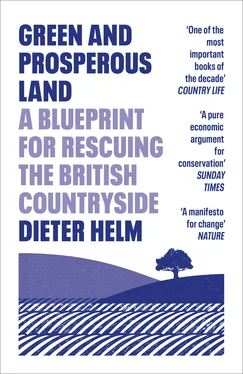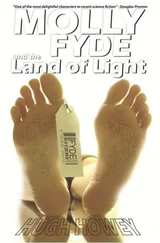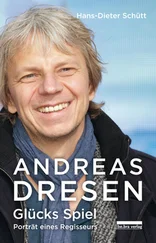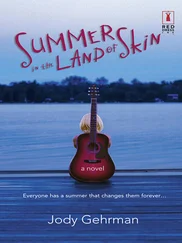GREEN AND PROSPEROUS LAND
A BLUEPRINT FOR RESCUING THE BRITISH COUNTRYSIDE

William Collins
An imprint of HarperCollins Publishers
1 London Bridge Street
London SE1 9GF
WilliamCollinsBooks.com
First published in Great Britain by William Collins in 2019
Copyright © Dieter Helm 2019
Cover illustration by Jack Smyth
Dieter Helm asserts the moral right to be identified as the author of this work.
A catalogue record for this book is available from the British Library.
All rights reserved under International and Pan-American Copyright Conventions. By payment of the required fees, you have been granted the non-exclusive, non-transferable right to access and read the text of this e-book on-screen. No part of this text may be reproduced, transmitted, down-loaded, decompiled, reverse engineered, or stored in or introduced into any information storage and retrieval system, in any form or by any means, whether electronic or mechanical, now known or hereinafter invented, without the express written permission of HarperCollins.
Source ISBN: 9780008304508
Ebook Edition © 2020 ISBN: 9780008304485
Version: 2020-02-25
Praise for Green and Prosperous Land
‘Dieter Helm has taken a good, hard look at the state of our natural environment and the result could be one of the most important books of the decade’ Country Life
‘Helm’s solutions are refreshingly straightforward … The notion of the financial value of nature is long established. Helm takes this further to present a pure economic argument for conservation. We all need to listen to that’ Simon Barnes, Sunday Times
‘[Helm is] as eloquent with his recommendations as in analysis of the problem … This is an important analysis, argued with passion, intelligence and rigour. It is timely too, because – as Helm makes compellingly clear – of the urgency of the problem’ Financial Times
‘A trenchant manifesto for change … visionary, pragmatic and context-rich’ Nature
‘Delivers handsomely on the promise of its title’ New Scientist
‘Helm is able to explain how a price can be put on the intangible. Rather brilliantly, he does so through presenting future scenarios, imagining what the country will be like in 2050 if current practices continue, and then what the alternative is if an agenda of policies is introduced and properly regulated … He makes a more optimistic future conceivable through domestic reforms … There is an enormous amount to admire’ Times Literary Supplement
‘Hooray for this book! An economist dispensing with the usual nonsense, and applying his mind to the task of devising a sound economic plan for the protection and restoration of Britain’s wildlife … [This is a] brave and forthright attempt to begin a new conversation on how to pay to keep our wildlife’ British Wildlife
‘A tough-minded and eminently practical plan for the recovery of our natural capital and the protection of our renewables … that might just make the Britain of 2050 a success story’ The Herald Magazine
‘A good read and an important one too. I loved it, as I agreed with much of it and was interested by all of it’ Mark Avery
‘This book is urgent. It should be required reading for all interested in turning the 25YEP into reality. I wonder if the next generation will recognise this book as a Rachel Carson-style moment that helped to kick-start the wholesale recovery of nature: I hope so’ BTO News
‘Written with intelligence and rigour, this is an important work’ The Week
To Sue, Oliver and Laura, as always, and to Amelie and Jake of the next generation in the hope that the natural environment they will inherit will be in better shape for them to enjoy.
They paved paradise
And put up a parking lot
With a pink hotel, a boutique
And a swinging hot spot
Don’t it always seem to go
That you don’t know what you’ve got til it’s gone
They paved paradise
And put up a parking lot
Big Yellow Taxi by Joni Mitchell, 1970
I thought it would last my time –
The sense that, beyond the town,
There would always be fields and farms,
Where the village louts could climb
Such trees as were not cut down;
I knew there’d be false alarms
[ … ]
Things are tougher than we are, just
As earth will always respond
However we mess it about;
Chuck filth in the sea, if you must:
The tides will be clean beyond.
– But what do I feel now? Doubt?
Selected verses from ‘Going, Going’ by Philip Larkin, 1972
CONTENTS
Cover
Title Page
Copyright
Praise for Green and Prosperous Land
Dedication
Epigraph
Preface
List of abbreviations
Introduction: Our natural capital inheritance
PART ONE: The Prize and the Risks
Chapter one: The prize
Chapter two: Business-as-usual
PART TWO: Building a Greener Economy
Chapter three: Restoring rivers
Chapter four: Green agriculture
Chapter five: The uplands
Chapter six: The coasts
Chapter seven: Nature in the towns and cities
PART THREE: Principles, Paying and the Plan
Chapter eight: Public goods
Chapter nine: Paying for pollution
Chapter ten: Natural capital markets, auctions and the net zero example
Chapter eleven: A Nature Fund
Chapter twelve: The plan
Conclusions: Securing the prize
Endnotes
Bibliography
Index
Acknowledgements
About the Author
About the Publisher
I have been thinking about the issues in this book for a long time. I grew up on the Essex marshes, and spent long hours around the sea walls and creeks of my grandfather’s farm. It is the place of my memories, and places are how we remember nature. It was a small farm by modern standards, around 350 acres. It was a mixed dairy and arable farm, with the traditional farmyard chickens and ducks, a big vegetable garden, a small orchard and of course beehives. It had a patchwork of more than a dozen fields, butting up to the sea wall.
In spring there were flocks of lapwing nesting so densely that it was difficult to avoid treading on the eggs. There were lots of skylarks and the full range of farmland birds, and of course a stand of great elms. House sparrows literally swarmed in the farmyard, which was often dense with flies and therefore swallows and house martins. There were barn owls. In winter, the marshes came alive with wildfowl. There were flocks of brent geese, teal and widgeon. So great were the numbers that books were written about wildfowling and punt guns and all the paraphernalia of Essex marsh life.[1]
Psychologists will tell you that what happens in that magic time of childhood forms the subsequent person. It is why getting children and nature together is so vital for the future of the environment. It is hard to put into a person’s mind what they never had in childhood. In my case, although most of my career has been spent in mainstream economics in Oxford, the experiences of those early years have never left me. It is one of the reasons why, in 2012 when I was given the opportunity to chair the Natural Capital Committee (NCC), I grabbed it.
Читать дальше












